- Home
- Julian Barnes
The Sense of an Ending Page 2
The Sense of an Ending Read online
Page 2
‘Eros and Thanatos,’ Adrian commented before the day’s first lesson. ‘Thanatos wins again.’
‘Robson wasn’t exactly Eros-and-Thanatos material,’ Alex told him. Colin and I nodded agreement. We knew because he’d been in our class for a couple of years: a steady, unimaginative boy, gravely uninterested in the arts, who had trundled along without offending anyone. Now he had offended us by making a name for himself with an early death. The flower of youth, indeed: the Robson we had known was vegetable matter.
There was no mention of disease, a bicycling accident or a gas explosion, and a few days later rumour (aka Brown of the Maths Sixth) supplied what the authorities couldn’t, or wouldn’t. Robson had got his girlfriend pregnant, hanged himself in the attic, and not been found for two days.
‘I’d never have thought he knew how to hang himself.’
‘He was in the Science Sixth.’
‘But you need a special sort of slip knot.’
‘That’s only in films. And proper executions. You can do it with an ordinary knot. Just takes longer to suffocate you.’
‘What do we think his girlfriend’s like?’
We considered the options known to us: prim virgin (now ex-virgin), tarty shopgirl, experienced older woman, VD-riddled whore. We discussed this until Adrian redirected our interests.
‘Camus said that suicide was the only true philosophical question.’
‘Apart from ethics and politics and aesthetics and the nature of reality and all the other stuff.’ There was an edge to Alex’s riposte.
‘The only true one. The fundamental one on which all others depend.’
After a long analysis of Robson’s suicide, we concluded that it could only be considered philosophical in an arithmetical sense of the term: he, being about to cause an increase of one in the human population, had decided it was his ethical duty to keep the planet’s numbers constant. But in all other respects we judged that Robson had let us – and serious thinking – down. His action had been unphilosophical, self-indulgent and inartistic: in other words, wrong. As for his suicide note, which according to rumour (Brown again) read ‘Sorry, Mum’, we felt that it had missed a powerful educative opportunity.
Perhaps we wouldn’t have been so hard on Robson if it hadn’t been for one central, unshiftable fact: Robson was our age, he was in our terms unexceptional, and yet he had not only conspired to find a girlfriend but also, incontestably, to have had sex with her. Fucking bastard! Why him and not us? Why had none of us even had the experience of failing to get a girlfriend? At least the humiliation of that would have added to our general wisdom, given us something to negatively boast about (‘Actually, “pustular berk with the charisma of a plimsole” were her exact words’). We knew from our reading of great literature that Love involved Suffering, and would happily have got in some practice at Suffering if there was an implicit, perhaps even logical, promise that Love might be on its way.
This was another of our fears: that Life wouldn’t turn out to be like Literature. Look at our parents – were they the stuff of Literature? At best, they might aspire to the condition of onlookers and bystanders, part of a social backdrop against which real, true, important things could happen. Like what? The things Literature was all about: love, sex, morality, friendship, happiness, suffering, betrayal, adultery, good and evil, heroes and villains, guilt and innocence, ambition, power, justice, revolution, war, fathers and sons, mothers and daughters, the individual against society, success and failure, murder, suicide, death, God. And barn owls. Of course, there were other sorts of literature – theoretical, self-referential, lachrymosely autobiographical – but they were just dry wanks. Real literature was about psychological, emotional and social truth as demonstrated by the actions and reflections of its protagonists; the novel was about character developed over time. That’s what Phil Dixon had told us anyway. And the only person – apart from Robson – whose life so far contained anything remotely novel-worthy was Adrian.
‘Why did your mum leave your dad?’
‘I’m not sure.’
‘Did your mum have another bloke?’
‘Was your father a cuckold?’
‘Did your dad have a mistress?’
‘I don’t know. They said I’d understand when I was older.’
‘That’s what they always promise. How about explaining it now, that’s what I say.’ Except that I never had said this. And our house, as far as I could tell, contained no mysteries, to my shame and disappointment.
‘Maybe your mum has a young lover?’
‘How would I know. We never meet there. She always comes up to London.’
This was hopeless. In a novel, Adrian wouldn’t just have accepted things as they were put to him. What was the point of having a situation worthy of fiction if the protagonist didn’t behave as he would have done in a book? Adrian should have gone snooping, or saved up his pocket money and employed a private detective; perhaps all four of us should have gone off on a Quest to Discover the Truth. Or would that have been less like literature and too much like a kids’ story?
In our final history lesson of the year, Old Joe Hunt, who had guided his lethargic pupils through Tudors and Stuarts, Victorians and Edwardians, the Rise of Empire and its Subsequent Decline, invited us to look back over all those centuries and attempt to draw conclusions.
‘We could start, perhaps, with the seemingly simple question, What is History? Any thoughts, Webster?’
‘History is the lies of the victors,’ I replied, a little too quickly.
‘Yes, I was rather afraid you’d say that. Well, as long as you remember that it is also the self-delusions of the defeated. Simpson?’
Colin was more prepared than me. ‘History is a raw onion sandwich, sir.’
‘For what reason?’
‘It just repeats, sir. It burps. We’ve seen it again and again this year. Same old story, same old oscillation between tyranny and rebellion, war and peace, prosperity and impoverishment.’
‘Rather a lot for a sandwich to contain, wouldn’t you say?’
We laughed far more than was required, with an end-of-term hysteria.
‘Finn?’
‘“History is that certainty produced at the point where the imperfections of memory meet the inadequacies of documentation.” ’
‘Is it, indeed? Where did you find that?’
‘Lagrange, sir. Patrick Lagrange. He’s French.’
‘So one might have guessed. Would you care to give us an example?’
‘Robson’s suicide, sir.’
There was a perceptible intake of breath and some reckless head-turning. But Hunt, like the other masters, allowed Adrian special status. When the rest of us tried provocation, it was dismissed as puerile cynicism – something else we would grow out of. Adrian’s provocations were somehow welcomed as awkward searchings after truth.
‘What has that to do with the matter?’
‘It’s a historical event, sir, if a minor one. But recent. So it ought to be easily understood as history. We know that he’s dead, we know that he had a girlfriend, we know that she’s pregnant – or was. What else do we have? A single piece of documentation, a suicide note reading “Sorry, Mum” – at least, according to Brown. Does that note still exist? Was it destroyed? Did Robson have any other motives or reasons beyond the obvious ones? What was his state of mind? Can we be sure the child was his? We can’t know, sir, not even this soon afterwards. So how might anyone write Robson’s story in fifty years’ time, when his parents are dead and his girlfriend has disappeared and doesn’t want to remember him anyway? You see the problem, sir?’
We all looked at Hunt, wondering if Adrian had pushed it too far this time. That single word ‘pregnant’ seemed to hover like chalk-dust. And as for the audacious suggestion of alternative paternity, of Robson the Schoolboy Cuckold … After a while, the master replied.
‘I see the problem, Finn. But I think you underestimate history. And for that matter histo
rians. Let us assume for the sake of argument that poor Robson were to prove of historical interest. Historians have always been faced with the lack of direct evidence for things. That’s what they’re used to. And don’t forget that in the present case there would have been an inquest, and therefore a coroner’s report. Robson may well have kept a diary, or written letters, made phone calls whose contents are remembered. His parents would have replied to the letters of condolence they received. And fifty years from now, given the current life expectancy, quite a few of his schoolfellows would still be available for interview. The problem might be less daunting than you imagine.’
‘But nothing can make up for the absence of Robson’s testimony, sir.’
‘In one way, no. But equally, historians need to treat a participant’s own explanation of events with a certain scepticism. It is often the statement made with an eye to the future that is the most suspect.’
‘If you say so, sir.’
‘And mental states may often be inferred from actions. The tyrant rarely sends a handwritten note requesting the elimination of an enemy.’
‘If you say so, sir.’
‘Well, I do.’
Was this their exact exchange? Almost certainly not. Still, it is my best memory of their exchange.
We finished school, promised lifelong friendship, and went our separate ways. Adrian, to nobody’s surprise, won a scholarship to Cambridge. I read history at Bristol; Colin went to Sussex, and Alex into his father’s business. We wrote letters to one another, as people – even the young – did in those days. But we had little experience of the form, so an arch self-consciousness often preceded any urgency of content. To start a letter, ‘Being in receipt of your epistle of the 17th inst’ seemed, for some while, quite witty.
We swore to meet every time the three of us at university came home for the vacation; yet it didn’t always work out. And writing to one another seemed to have recalibrated the dynamics of our relationship. The original three wrote less often and less enthusiastically to one another than we did to Adrian. We wanted his attention, his approval; we courted him, and told him our best stories first; we each thought we were – and deserved to be – closest to him. And though we were making new friends ourselves, we were somehow persuaded that Adrian wasn’t: that we three were still his nearest intimates, that he depended on us. Was this just to disguise the fact that we were dependent on him?
And then life took over, and time speeded up. In other words, I found a girlfriend. Of course, I’d met a few girls before, but either their self-assurance made me feel gauche, or their nervousness compounded my own. There was, apparently, some secret masculine code, handed down from suave twenty-year-olds to tremulous eighteen-year-olds, which, once mastered, enabled you to ‘pick up’ girls and, in certain circumstances, ‘get off’ with them. But I never learnt or understood it, and probably still don’t. My ‘technique’ consisted in not having a technique; others, no doubt rightly, considered it ineptitude. Even the supposedly simple trail of like-a-drink-fancy-a-dance-walk-you-home-how-about-a-coffee? involved a bravado I was incapable of. I just hung around and tried to make interesting remarks while expecting to mess things up. I remember feeling sad through drink at a party in my first term, and when a passing girl asked sympathetically if I was OK, I found myself replying, ‘I think I’m a manic depressive,’ because at the time it felt more characterful than ‘I’m feeling a bit sad.’ When she replied, ‘Not another,’ and moved swiftly on, I realised that, far from making myself stand out from the cheery crowd, I had attempted the world’s worst pick-up line.
My girlfriend was called Veronica Mary Elizabeth Ford, information (by which I mean her middle names) it took me two months to extract. She was reading Spanish, she liked poetry, and her father was a civil servant. About five foot two with rounded, muscular calves, mid-brown hair to her shoulders, blue-grey eyes behind blue-framed spectacles, and a quick yet withholding smile. I thought she was nice. Well, I probably would have found any girl who didn’t shy away from me nice. I didn’t try telling her I felt sad because I didn’t. She owned a Black Box record player to my Dansette, and had better musical taste: that’s to say, she despised Dvořák and Tchaikovsky, whom I adored, and owned some choral and lieder LPs. She looked through my record collection with an occasional flickering smile and a more frequent frown. The fact that I’d hidden both the 1812 Overture and the soundtrack to Un Homme et Une Femme didn’t spare me. There was enough dubious material even before she reached my extensive pop section: Elvis, the Beatles, the Stones (not that anyone could object to them, surely), but also the Hollies, the Animals, the Moody Blues and a two-disc boxed set of Donovan called (in lower case) a gift from a flower to a garden.
‘You like this stuff?’ she asked neutrally.
‘Good to dance to,’ I replied, a little defensively.
‘Do you dance to it? Here? In your room? By yourself?’
‘No, not really.’ Though of course I did.
‘I don’t dance,’ she said, part anthropologist, part layer-down of rules for any relationship we might have, were we to go out together.
I’d better explain what the concept of ‘going out’ with someone meant back then, because time has changed it. I was talking recently to a woman friend whose daughter had come to her in a state of distress. She was in her second term at university, and had been sleeping with a boy who had – openly, and to her knowledge – been sleeping with several other girls at the same time. What he was doing was auditioning them all before deciding which to ‘go out’ with. The daughter was upset, not so much by the system – though she half-perceived its injustice – as by the fact that she hadn’t been the one finally chosen.
This made me feel like a survivor from some antique, bypassed culture whose members were still using carved turnips as a form of monetary exchange. Back in ‘my day’ – though I didn’t claim ownership of it at the time, still less do I now – this is what used to happen: you met a girl, you were attracted to her, you tried to ingratiate yourself, you would invite her to a couple of social events – for instance, the pub – then ask her out on her own, then again, and after a goodnight kiss of variable heat, you were somehow, officially, ‘going out’ with her. Only when you were semi-publicly committed did you discover what her sexual policy might be. And sometimes this meant her body would be as tightly guarded as a fisheries exclusion zone.
Veronica wasn’t very different from other girls of the time. They were physically comfortable with you, took your arm in public, kissed you until the colour rose, and might consciously press their breasts against you as long as there were about five layers of clothing between flesh and flesh. They would be perfectly aware of what was going on in your trousers without ever mentioning it. And that was all, for quite a while. Some girls allowed more: you heard of those who went in for mutual masturbation, others who permitted ‘full sex’, as it was known. You couldn’t appreciate the gravity of that ‘full’ unless you’d had a lot of the half-empty kind. And then, as the relationship continued, there were certain implicit trade-offs, some based on whim, others on promise and commitment – up to what the poet called ‘a wrangle for a ring’.
Subsequent generations might be inclined to put all this down to religion or prudery. But the girls – or women – with whom I had what might be called infra-sex (yes, it wasn’t only Veronica) were at ease with their bodies. And, if certain criteria obtained, with mine. I don’t mean to suggest, by the way, that infra-sex was unexciting, or even, except in the obvious way, frustrating. Besides, these girls were allowing far more than their mothers had, and I was getting far more than my father had done. At least, so I presumed. And anything was better than nothing. Except that, in the meantime, Colin and Alex had fixed themselves up with girlfriends who didn’t have any exclusion-zone policies – or so their hints implied. But then, no one told the whole truth about sex. And in that respect, nothing has changed.
I wasn’t exactly a virgin, just in case you were
wondering. Between school and university I had a couple of instructive episodes, whose excitements were greater than the mark they left. So what happened subsequently made me feel all the odder: the more you liked a girl, and the better matched you were, the less your chance of sex, it seemed. Unless, of course – and this is a thought I didn’t articulate until later – something in me was attracted to women who said no. But can such a perverse instinct exist?
‘Why not?’ you would ask, as a restraining hand was clamped to your wrist.
‘It doesn’t feel right.’
This was an exchange heard in front of many a breathy gas fire, counterpointed by many a whistling kettle. And there was no arguing against ‘feelings’, because women were experts in them, men coarse beginners. So ‘It doesn’t feel right’ had far more persuasive force and irrefutability than any appeal to church doctrine or a mother’s advice. You may say, But wasn’t this the Sixties? Yes, but only for some people, only in certain parts of the country.
My bookshelves were more successful with Veronica than my record collection. In those days, paperbacks came in their traditional liveries: orange Penguins for fiction, blue Pelicans for non-fiction. To have more blue than orange on your shelf was proof of seriousness. And overall, I had enough of the right titles: Richard Hoggart, Steven Runciman, Huizinga, Eysenck, Empson … plus Bishop John Robinson’s Honest to God next to my Larry cartoon books. Veronica paid me the compliment of assuming I’d read them all, and didn’t suspect that the most worn titles had been bought second-hand.
Her own shelves held a lot of poetry, in volume and pamphlet form: Eliot, Auden, MacNeice, Stevie Smith, Thom Gunn, Ted Hughes. There were Left Book Club editions of Orwell and Koestler, some calf-bound nineteenth-century novels, a couple of childhood Arthur Rackhams, and her comfort book, I Capture the Castle. I didn’t for a moment doubt that she had read them all, or that they were the right books to own. Further, they seemed to be an organic continuation of her mind and personality, whereas mine struck me as functionally separate, straining to describe a character I hoped to grow into. This disparity threw me into a slight panic, and as I looked along her poetry shelf I fell back on a line of Phil Dixon’s.

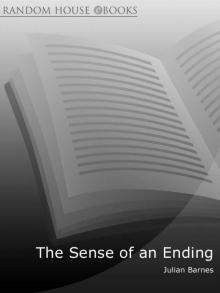 The Sense of an Ending
The Sense of an Ending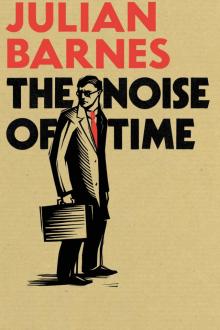 The Noise of Time
The Noise of Time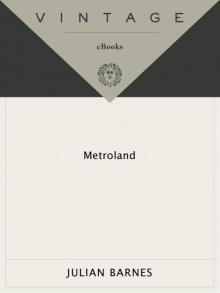 Metroland
Metroland Letters From London
Letters From London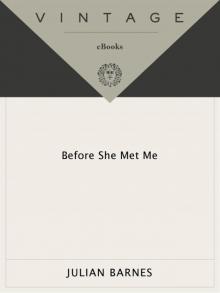 Before She Met Me
Before She Met Me Pulse
Pulse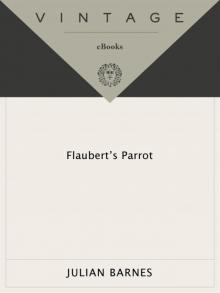 Flaubert's Parrot
Flaubert's Parrot England, England
England, England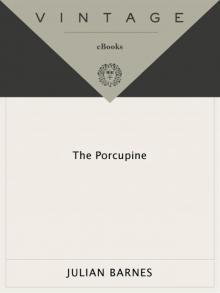 The Porcupine
The Porcupine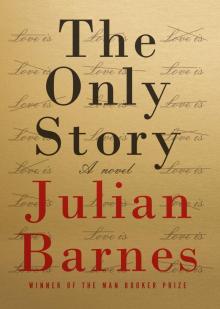 The Only Story
The Only Story Love, Etc
Love, Etc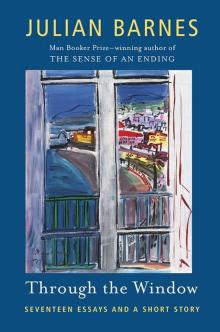 Through the Window: Seventeen Essays and a Short Story
Through the Window: Seventeen Essays and a Short Story Staring at the Sun
Staring at the Sun Cross Channel
Cross Channel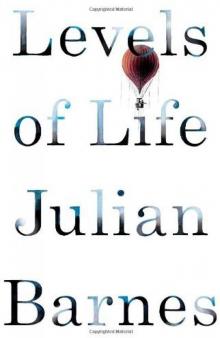 Levels of Life
Levels of Life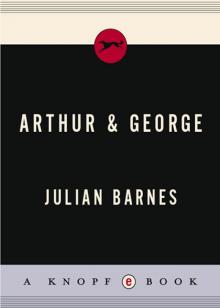 Arthur & George
Arthur & George Love, Etc.
Love, Etc.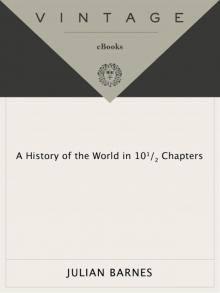 A History of the World in 10 1/2 Chapters
A History of the World in 10 1/2 Chapters Something to Declare
Something to Declare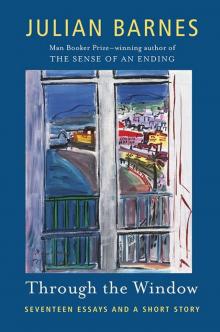 Through the Window: Seventeen Essays and a Short Story (Vintage International)
Through the Window: Seventeen Essays and a Short Story (Vintage International)